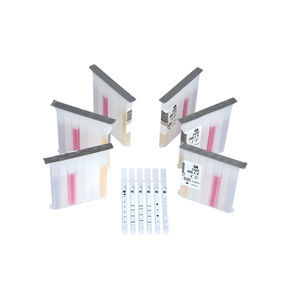
Autoimmune disease test kit 4028ANCAIgGmyeloperoxidase
Add to favorites
Compare this product
Characteristics
- Applications
- for autoimmune diseases
- Tested parameter
- ANCA, IgG, myeloperoxidase
- Sample type
- serum
- Analysis mode
- immunoassay, immunofluorescence
- Format
- strip
- Result display time
80 min
Description
The ANCA Dot is a qualitative dot immunoassay for the determination of IgG antibodies against myeloperoxidase (MPO), proteinase 3 (PR3) and glomerular basement membrane (GBM) in human serum. The ANCA Dot is intended as an aid in the diagnosis of systemic vasculitis and autoimmune renal disorders in conjunction with other clinical and laboratory findings. The immunoassay is designed for manual professional in vitro diagnostic use.
Diagnostic Relevance
Systemic vasculitis (SV) pathogenesis is majorly identified by the inflammation of different blood vessel walls, and the resulting morphological changes. Anti-neutrophil cytoplasmic antibodies (ANCA) play an essential role in the serological diagnosis of SV. These antibodies are usually determined by indirect immunofluorescence using ethanol fixed human neutrophils. Cytoplasmic ANCA (cANCA) and perinuclear ANCA (pANCA) are distinguished based on the immunofluorescence pattern.
Goodpasture syndrome, a medical emergency with a high fatality rate if not treated, is characterized by glomerulonephritis, pulmonary haemorrhage and antibody formation against glomerular basement membrane (GBM). The antibodies targeted against GBM component are the primary pathogenic autoantibodies, binding along the glomerular basement membrane and inducing glomerulonephritis in all patients with Goodpasture syndrome. Their determination allows differentiating the syndrome from other causes of glomerular nephritis and pulmonary haemorrhage.
Catalogs
No catalogs are available for this product.
See all of MEDIPAN GmbH‘s catalogsRelated Searches
- Assay kit
- Blood assay kit
- Serum assay kit
- Immunoassay assay kit
- Plasma assay kit
- Infectious disease detection kit
- Rapid lateral flow test
- Immunoassay rapid diagnostic test
- Clinical assay kit
- Lateral flow test kit
- ELISA assay kit
- IgG test kit
- Strip detection kit
- Laboratory detection kit
- Bacteria rapid diagnostic test
- Rapid feces test
- Nasopharyngeal assay kit
- Antibody assay kit
- Feces test kit
- Immunofluorescence test kit
*Prices are pre-tax. They exclude delivery charges and customs duties and do not include additional charges for installation or activation options. Prices are indicative only and may vary by country, with changes to the cost of raw materials and exchange rates.













